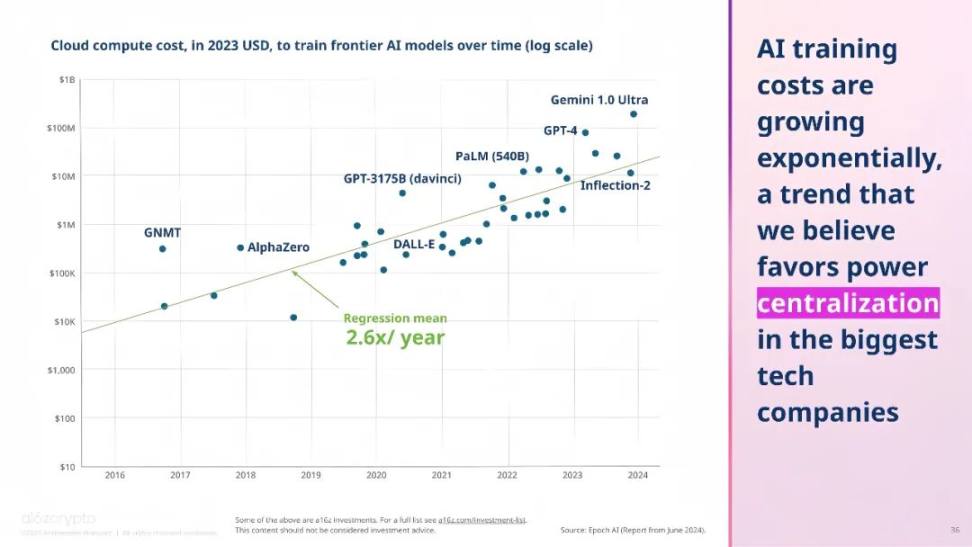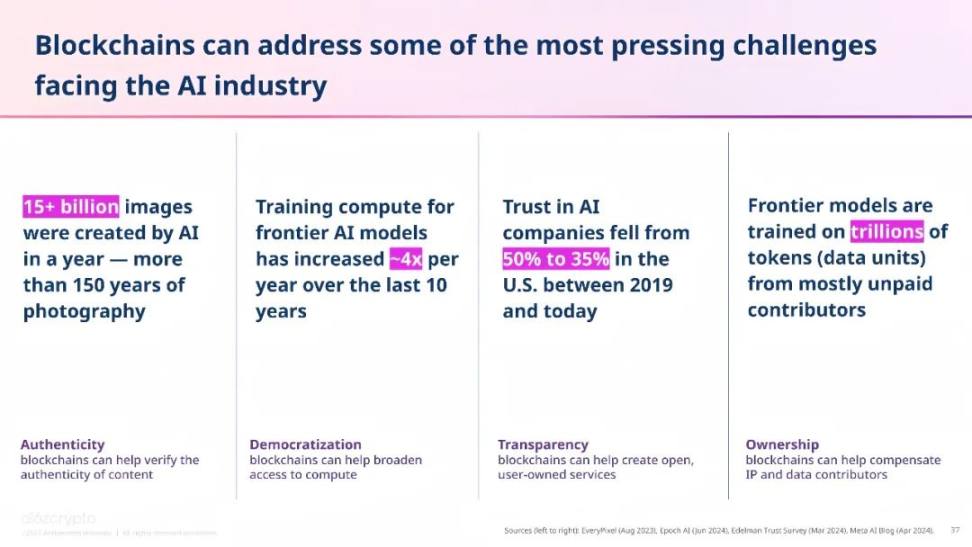The challenges faced by artificial intelligence include, but are not limited to, high development costs, increasing centralization of development, and declining user trust.
Source: cryptoslate
Translation: Blockchain Knight
According to the report "2024 State of Crypto Assets" released by a16z, Crypto assets play a significant role in addressing the challenges posed by artificial intelligence (AI).
One of the issues facing artificial intelligence is that development is becoming increasingly expensive and centralized, while the report provides decentralized solutions centered around blockchain technology.

The report emphasizes that currently, 34% of Crypto asset projects are utilizing artificial intelligence, a significant increase from 27% in 2023, with many projects focusing on making AI more accessible through decentralized networks.
At the same time, the skyrocketing costs of developing and training advanced AI models have led to resources being concentrated in a few large tech companies. This centralization limits innovation and restricts access to the computational power needed for AI breakthroughs.
However, Crypto asset projects are beginning to change this situation by decentralizing access to AI resources.

The report points out that projects like Gensyn are working towards the democratization of AI computing power.
Gensyn's decentralized network allows smaller developers and startups to access the computational resources needed to train AI models, eliminating the financial barriers traditionally associated with AI development.
By decentralizing AI infrastructure, these projects provide more participants with opportunities to innovate in the field of AI, rather than allowing AI to be controlled by a few dominant players.
In addition to decentralizing resources, blockchain technology can enhance the transparency of AI processes, particularly in terms of intellectual property (IP) and content verification.
Projects like Near and Story use blockchain to track and verify the origins of digital content, ensuring that creators receive appropriate credit and compensation.
This verification system addresses an increasingly serious issue in the field of AI, where training datasets often include materials from creators without authorization and compensation.
The report also suggests that the transparency of blockchain technology helps restore public trust in the AI industry.
Over the past five years, public trust in AI companies in the United States has significantly declined, from 50% to 35% in 2024.
Crypto asset developers are increasingly integrating AI into their projects, with blockchain infrastructure remaining the category with the highest adoption of AI.

According to a16z's Builder Energy dashboard, builders are using AI to optimize smart contracts, enhance decentralized autonomous organizations (DAOs), and improve algorithmic trading systems.
The report notes that as blockchain infrastructure continues to improve, the potential for AI-driven applications within the Crypto ecosystem is also expanding.
Significant advancements in blockchain technology have greatly reduced transaction costs, making it easier to build scalable AI-driven applications.
The reduction in costs provides more opportunities for experimentation and innovation in combining AI with decentralized technology, leading to the development of new applications in areas such as authentication, prediction markets, and content certification.
These use cases demonstrate the potential of AI to unlock new functionalities on blockchain platforms.
免责声明:本文章仅代表作者个人观点,不代表本平台的立场和观点。本文章仅供信息分享,不构成对任何人的任何投资建议。用户与作者之间的任何争议,与本平台无关。如网页中刊载的文章或图片涉及侵权,请提供相关的权利证明和身份证明发送邮件到support@aicoin.com,本平台相关工作人员将会进行核查。




